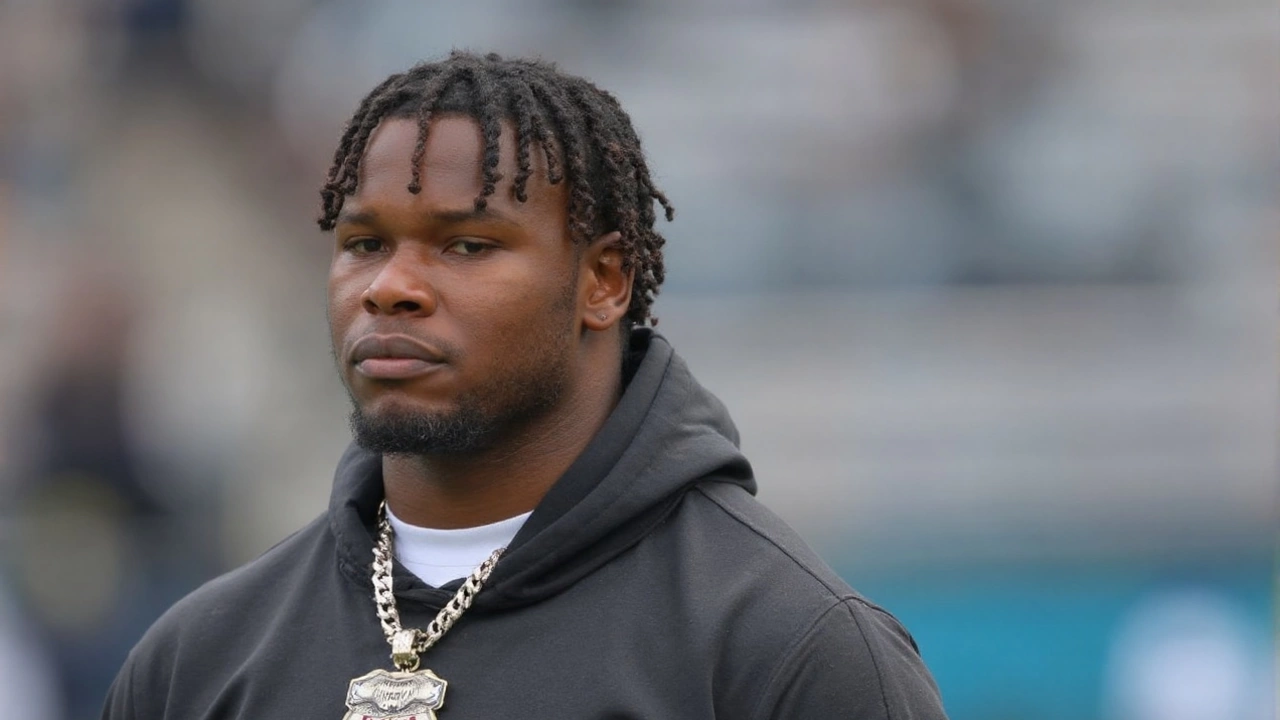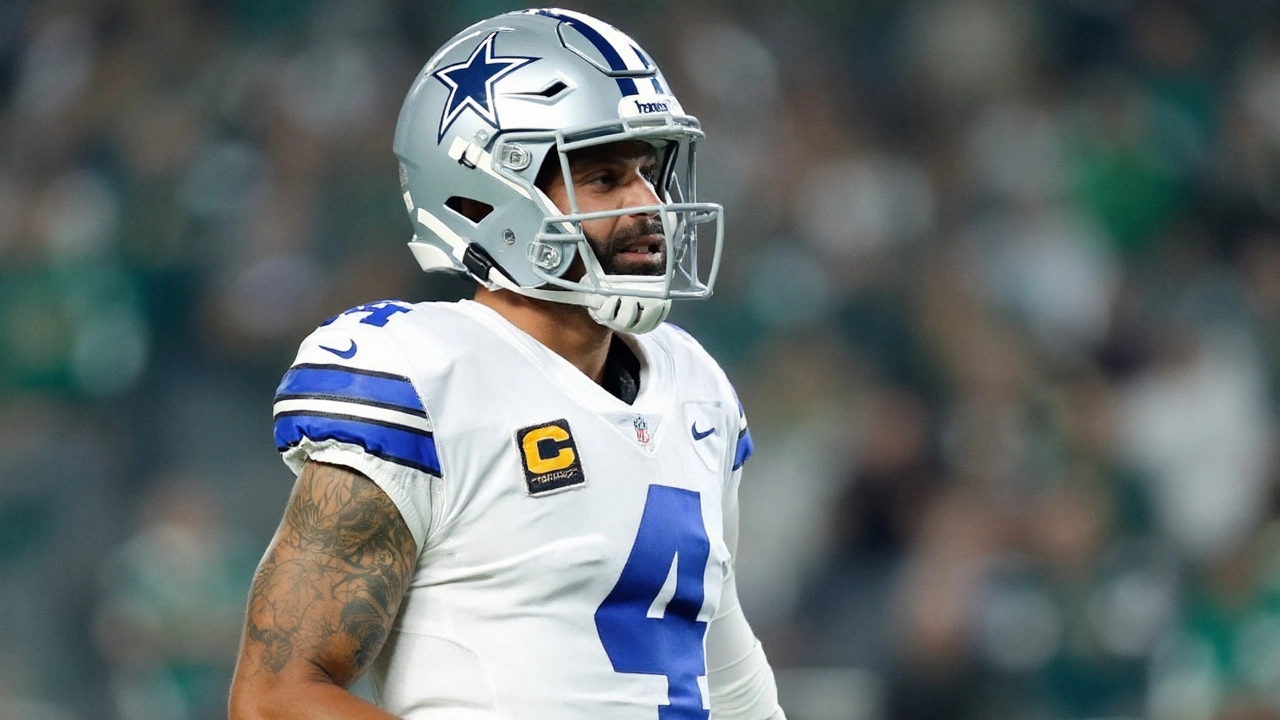Six seconds, one ejection, and a rivalry already on fire
Six ticks into the NFL season, the night swung hard. On Philadelphia’s banner-raising evening, with fireworks still hanging in the air, Jalen Carter was tossed before a snap was even played. The Eagles’ Pro Bowl defensive tackle was ejected for spitting on Cowboys quarterback Dak Prescott during an injury timeout, a stunning moment that turned Lincoln Financial Field from celebration to disbelief.
The sequence unfolded after the opening kickoff, when Eagles fullback Ben VanSumeren went down with a knee injury and was carted off. During the pause, Carter and Prescott jawed face-to-face. TV cameras caught Carter’s spit landing on Prescott’s jersey. Prescott immediately pointed to the nearest official. The flag came out for unsportsmanlike conduct, and the referee sent Carter off. Team security chief Dom DiSandro escorted him to the tunnel as the crowd tried to process what had just happened.
Ejections that early are almost unheard of, and spitting is one of those lines players know not to cross. Under the NFL’s unsportsmanlike conduct rules, officials can disqualify a player for flagrant behavior, and spitting at an opponent sits squarely in that category. The league office will review it, as it does with any ejection involving personal conduct, and can add a fine or more.
Here’s the twist: later video angles showed Prescott spitting too, but toward the ground near Carter’s feet rather than on him. That matters. As one well-sourced league reporter noted on air, spitting generally isn’t punishable unless it’s directed at someone. The distinction—on a person versus near them—was likely the difference between Carter leaving early and Prescott staying in.
None of it stopped the game from charging on. Dallas seized the moment, marching 75 yards in six plays and punching in a short rushing score by Javonte Williams to quiet the building. Philadelphia steadied, leaned on depth along the defensive front, and survived a lightning delay before outlasting the Cowboys 24-20. Banner night ended with a win, but the conversation as fans filed out wasn’t about the score. It was about the ejection.
Prescott, who called it more surprising than anything, didn’t gloat. He acknowledged the 15 yards and the momentum swing while calling Carter a heck of a player. Carter didn’t speak publicly before the locker room closed. The Eagles, who have typically handled disciplinary matters behind closed doors, offered no immediate update on any internal steps.

What the ejection means for the Eagles, the Cowboys, and the league
For Philadelphia, the fallout cuts two ways. On the field, Carter is the point of the spear for a defense that ranked near the top of the league last season. He posted 4.5 sacks and 12 tackles for loss in 2024, numbers that don’t fully capture how often he wrecked plays. Losing him on the first series forced the Eagles to reshuffle their front, spread snaps to the rotation, and find pressure without their best interior disruptor. They did enough, but that approach is harder to sustain week after week.
Off the field, the timing is brutal. This was supposed to be a statement night—a ring ceremony vibe, a fresh season, a rival in town. When emotions run that hot, players talk. But spitting crosses a basic line of respect that even the fiercest rivals usually honor. The league office reviews ejections early in the week, and the standard menu includes fines for unsportsmanlike conduct. Suspensions are less common for single incidents like this unless the action is deemed extreme, but it’s on the table until the league says otherwise.
For Dallas, the immediate benefit was obvious. A short field helped no one here; the penalty yardage and the psychological swing did. The Cowboys went right at a shaken defense and finished the drive. From there, things normalized. Philadelphia adjusted, and Dallas had to play a full, choppy, weather-delayed game without the early edge turning into a runaway.
The officiating piece is more straightforward than it might appear on television. Referees are trained to separate trash talk—common and usually harmless—from acts that escalate risk or disrespect. Spitting falls in the latter. Once the official saw contact with Prescott, the ejection became a live option. The replay that captured Prescott spitting toward the ground doesn’t create “offsetting” behavior under the rules because intent and direction matter. That’s why league insiders quickly indicated Prescott wouldn’t face discipline.
The moment also revives a running NFL conversation: where to draw the line on taunting and decorum in a sport built on aggression. The league tightened taunting enforcement in recent years, then softened after backlash from players and fans who felt routine emotion was being penalized. Spitting is not part of that gray area. It’s a clear violation of basic sportsmanship and an easy call for the league to fine.
Carter’s profile adds weight. At 24 and already a Pro Bowler, he’s one of the faces of a defense that expects to carry Philadelphia deep into January. The Eagles traded up to draft him ninth overall in 2023, betting on elite talent that flashes every Sunday. When his head is on straight, he blows up double teams and ruins blocking plans. That’s exactly why his availability—and composure—matter so much to a team with title hopes.
There’s also the human layer. Banner night can get players caught between adrenaline and the long season ahead. You can see it on opening drives every year—late hits, jawing, extra shoves after the whistle. The difference here was a choice that left the officials no wiggle room. Spitting turns a heated exchange into a disciplinary issue, and it puts teammates, coaches, and the league in cleanup mode.
What happens now? Expect a review by the league’s football operations department early this week. The process is routine: gather broadcast angles, officials’ reports, and any sideline accounts; weigh the conduct against the rulebook; issue a fine schedule or more if warranted. Teams can add their own discipline, though clubs often defer to the league unless a pattern develops.
Three immediate questions hang over the Eagles:
- Availability: Will the league add a fine only, or consider a suspension? A fine is the most likely outcome for a first incident of this type, but nothing is official yet.
- Depth plan: If Carter misses additional time, the Eagles will have to lean harder on their rotation inside and tweak pressure packages to protect the second level.
- Message: How the team addresses this internally matters. The Eagles have built a culture around accountability, and veterans in the room won’t want a repeat.
And for the Cowboys? They’ll move on with a split-screen memory: the jolt of an early call going their way and the frustration of not converting it into a road win. In a tight NFC, little swings in Week 1 can loom in December. They don’t change seasons on their own, but they set tones.
It’s worth noting how rare this was in context. Rivalries like Eagles–Cowboys live on emotion and history, but early ejections are outliers. You could feel that in the building when DiSandro, the well-known head of Eagles security, walked Carter off. It wasn’t triumph or outrage from the stands—more a stunned hush that told you everyone understood the stakes and the line that had been crossed.
As for VanSumeren, the player whose injury timeout set the stage, the team did not provide an immediate update on his knee. That development matters too. Special teams are the opening-drive hinges of every game, and injuries there crack open depth charts in a hurry.
On a night that began with a championship banner and ended with a one-score win, the NFL’s first flashpoint arrived fast and messy. The scoreboard says the Eagles handled it. The calendar says the season just started. How Philadelphia and the league respond this week will tell us what the cost really is.
